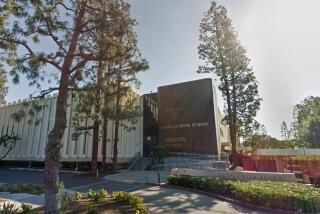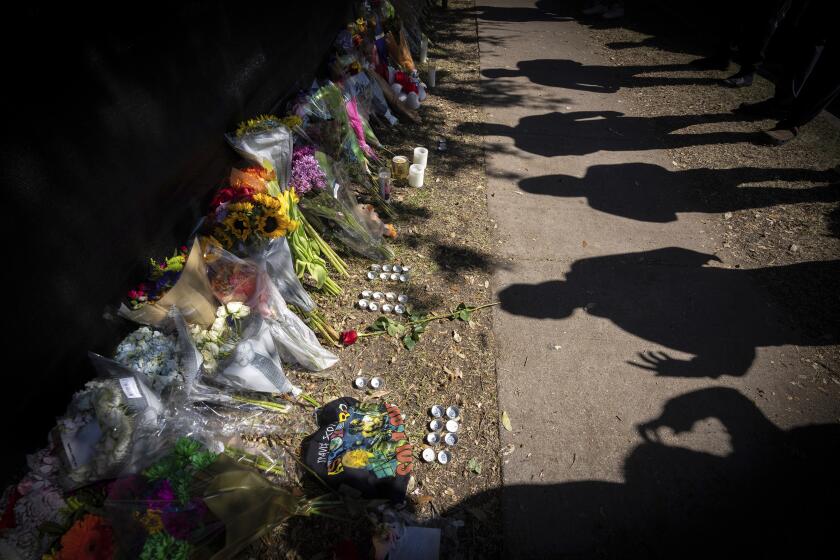Supreme Court to consider educators’ response to cyber-bullying
A middle school principal in northeastern Pennsylvania was shocked to see his photo online along with a description of him as a “hairy sex addict” and a “pervert” who liked “hitting on students” in his office.
A high school principal north of Pittsburgh saw a MySpace profile of himself that called him a “big fag,” a “whore” and a drug user. And in West Virginia, a school principal found out that a girl had created an online site to maliciously mock another girl as a “slut” with herpes.
All three students were suspended from school and filed suits against the principal and the school districts. They argued the 1st Amendment protected them from being punished for postings from their home computers. And in the two Pennsylvania cases, they won.
Now, the U.S. Supreme Court is being asked to decide for the first time on the dividing line between the rights of students to freely use their own computers and the authority of school officials to prevent online harassment of other students and the staff. It may act as early as Tuesday.
The Internet and social media have wiped out the line between what is public and private as well as the distinction between on-campus and off-campus conduct at schools. A posting on Facebook makes its way around the student body far faster than old-fashioned gossip.
School principals say they are caught between the new technology and outdated, confusing legal rules.
“They need to tell us what we can and cannot do. This affects every educator in this country,” said James McGonigle, principal at Blue Mountain Middle School in Orwigsburg, Pa., near Allentown, who was portrayed as a “hairy sex addict” by an eighth-grade girl.
He imposed a 10-day suspension. A week later, the girl’s parents sued him in federal court.
McGonigle learned of the MySpace profile from students and teachers who said they found it disturbing. He agreed once he saw a photocopy at school. It included mockeries of his wife and children.
“It made me out as a pedophile. If any of those accusations were taken seriously, I would have been put through a wrenching investigation,” he said in an interview. The American Civil Liberties Union sued on behalf of Terry and Steven Snyder, the girl’s parents. Their lawyers said the fake profile of the principal was “juvenile humor” that should be ignored.
The parents lost before a federal judge, who nonetheless called the posting “vulgar and lewd.” But last summer, they won before the full 3rd Circuit Court of Appeals in Philadelphia. The 8-6 majority said that the posting “caused no substantial disruption” at the school and that the courts did not “allow schools to punish students for off-campus speech.” Doing so, the majority said, threatens “dangerously broad censorship” of students.
If the Supreme Court turns down the appeal in Blue Mountain School District vs. Snyder, the district will be required to pay damages to the parents as well as legal fees to the ACLU.
The same is true for Hermitage School District in western Pennsylvania. It was sued by the parents of a 17-year-old senior who was suspended for his MySpace profile that mocked his principal. The 3rd Circuit Court said the school generally “cannot punish a student for expressive conduct that originated outside of the schoolhouse.”
But the 4th Circuit Court of Appeals took the opposite view last summer in the case of Kara Kowalski, a West Virginia senior who invited 100 classmates to see a MySpace profile that made fun of another girl as a “slut” who had herpes. School officials called it a “hate website” and suspended her for violating the policy against harassment and bullying.
In Kowalski’s appeal, her lawyer described her as a cheerleader and “the reigning ‘charm queen’ of her school,” but the appeals court threw out her free-speech suit. She “used the Internet to orchestrate a targeted attack on a classmate,” the judges said. Her appeal in Kowalski vs. Berkeley County Schools also came before the high court last week.
A national coalition of school officials and counselors urged the high court to weigh in. They said principals regularly confront “cyber-bullying” between students, but it is unclear whether they have the legal authority to act.
“The court needs to explain when school officials have the power to regulate off-campus student speech,” said David L. Hudson, a 1st Amendment scholar at Vanderbilt University. “The phenomenon of cyber-bullying ratchets up the importance of the issue.”
More to Read
Start your day right
Sign up for Essential California for news, features and recommendations from the L.A. Times and beyond in your inbox six days a week.
You may occasionally receive promotional content from the Los Angeles Times.






